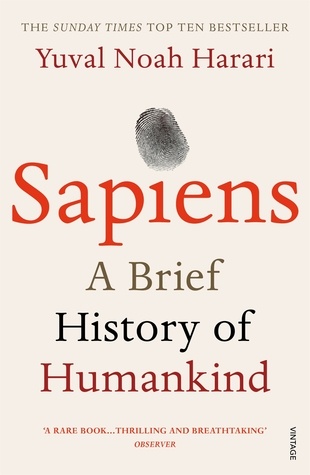
Sapiens
Yuval Noah Harari
A good rule of thumb is ‘Biology enables, culture forbids.’ Biology is willing to tolerate a very wide spectrum of possibilities. It’s culture that obliges people to realise some possibilities while forbidding others.
Ever since the Cognitive Revolution, Sapiens have thus been living in a dual reality. On the one hand, the objective reality of rivers, trees and lions; and on the other hand, the imagined reality of gods, nations and corporations. As time went by, the imagined reality became ever more powerful, so that today the very survival of rivers, trees and lions depends on the grace of imagined entities such as the United States and Google.
How do you cause people to believe in an imagined order such as Christianity, democracy or capitalism? First, you never admit that the order is imagined. You always insist that the order sustaining society is an objective reality created by the great gods or by the laws of nature. People are unequal, not because Hammurabi said so, but because Enlil and Marduk decreed it. People are equal, not because Thomas Jefferson said so, but because God created them that way. Free markets are the best economic system, not because Adam Smith said so, but because these are the immutable laws of nature.
Large numbers of strangers can cooperate successfully by believing in common myths. Any large-scale human cooperation – whether a modern state, a medieval church, an ancient city or an archaic tribe – is rooted in common myths that exist only in people’s collective imagination.
One of history’s few iron laws is that luxuries tend to become necessities and to spawn new obligations.
The Worship of Man The last 300 years are often depicted as an age of growing secularism, in which religions have increasingly lost their importance. If we are talking about theist religions, this is largely correct. But if we take into consideration natural-law religions, then modernity turns out to be an age of intense religious fervour, unparalleled missionary efforts, and the bloodiest wars of religion in history. The modern age has witnessed the rise of a number of new natural-law religions, such as liberalism, Communism, capitalism, nationalism and Nazism. These creeds do not like to be called religions, and refer to themselves as ideologies. But this is just a semantic exercise. If a religion is a system of human norms and values that is founded on belief in a superhuman order, then Soviet Communism was no less a religion than Islam. Islam is of course different from Communism, because Islam sees the superhuman order governing the world as the edict of an omnipotent creator god, whereas Soviet Communism did not believe in gods. But Buddhism too gives short shrift to gods, and yet we commonly classify it as a religion. Like Buddhists, Communists believed in a superhuman order of natural and immutable laws that should guide human actions. Whereas Buddhists believe that the law of nature was discovered by Siddhartha Gautama, Communists believed that the law of nature was discovered by Karl Marx, Friedrich Engels and Vladimir Ilyich Lenin. The similarity does not end there. Like other religions, Communism too has its holy scripts and prophetic books, such as Marx’s Das Kapital, which foretold that history would soon end with the inevitable victory of the proletariat. Communism had its holidays and festivals, such as the First of May and the anniversary of the October Revolution. It had theologians adept at Marxist dialectics, and every unit in the Soviet army had a chaplain, called a commissar, who monitored the piety of soldiers and officers. Communism had martyrs, holy wars and heresies, such as Trotskyism. Soviet Communism was a fanatical and missionary religion. A devout Communist could not be a Christian or a Buddhist, and was expected to spread the gospel of Marx and Lenin even at the price of his or her life. Religion is a system of human norms and values that is founded on belief in a superhuman order. The theory of relativity is not a religion, because (at least so far) there are no human norms and values that are founded on it. Football is not a religion because nobody argues that its rules reflect superhuman edicts. Islam, Buddhism and Communism are all religions, because all are systems of human norms and values that are founded on belief in a superhuman order.